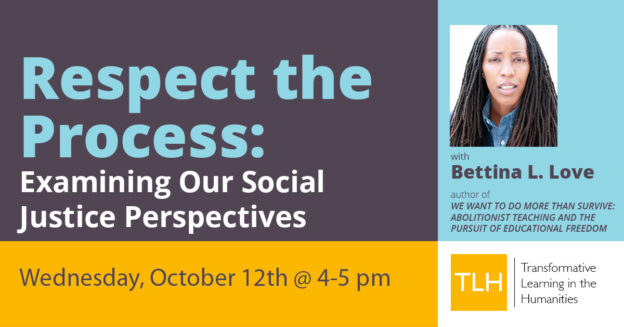On Wednesday, October 12th TLH hosted the Zoom workshop “Respect the Process: Examining Our Social Justice Perspectives in the Classroom” with Dr. Bettina Love. TLH Faculty Co-Director Dr. Shelly Eversley introduced Dr. Love, and shared her quote, “Education can’t save us, we must save education.” This set the tone for the event, as Dr. Love shared how we must transform our classrooms into sites of healing.
Dr. Love shared a quote from James Baldwin’s 1963 speech, “A Talk to Teachers,” in which he articulated how antiracism will be met with resistance as we are in a revolutionary situation. She discussed how many students come to us in “survival mode,” highlighted in her book We Want to Do More Than Survive, and revealed how we must heal and enlighten them, that this must happen before learning can occur. Dr. Love shared her practice of creating a healing classroom, including spending up to the first half an hour of class checking in with students, making sure they feel safe and asking for consent to discuss heavy topics, thus pointing to the importance of teaching and engaging with hard content in a way that is conducive to healing, instead of just creating awareness about Black trauma: “Nothing can happen if they don’t feel safe.” In addition to checking in with student wellbeing, Dr. Love made clear to us that teachers must check in and be okay as well to create such an environment. She discussed heavy topics such as school integration, making clear that such a movement is not over: schools are more segregated now than they’ve ever been since Brown v. Board. Dr. Love highlighted the importance of our interconnectedness and our humanity: abolitionist education is about seeing the humanity in people. She also discussed the sanitizing of civil rights leaders, such as MLK, who was staunchly anti-capitalist, discussing his work with the Poor People’s Campaign. She then emphasized the need for a revolution of values, as material conditions have not changed, though now we have buzzwords being used in DEI initiatives: it’s not about inclusion, we must see Black people as integral to our structures and society, because they are. Classrooms should be spaces to imagine and freedom to dream, she asks that we teach through a lens of Black Joy where we celebrate Black folx. Dr. Love ended her talk with a recording of the poem won’t you celebrate with me by Lucille Clifton.
The question and answer portion saw a lot of engagement and appreciation for Dr. Love’s talk. Someone asked about moving beyond DEI work, and Dr. Love shared that we must investigate our institution’s relationship to the police, and where our universities get money from and what they spend money on: who’s tenure track, who’s adjuncting? Equity means action, DEI is just professional development to support the institution’s brand.
Dr. Love shared these tools to support healing in the classroom:
- Check in at the start of class
- Prepare a safe space to learn
- Understand students’ lives
- Faculty – Check your ego
- Create due dates around students’ schedules/lives
- Mandatory fun & self care
- Play and be creative
- Don’t show Black trauma & death – respect people’s lives
- Faculty – Be well
- Faculty – Do no harm
- Create a community that holds you accountable


